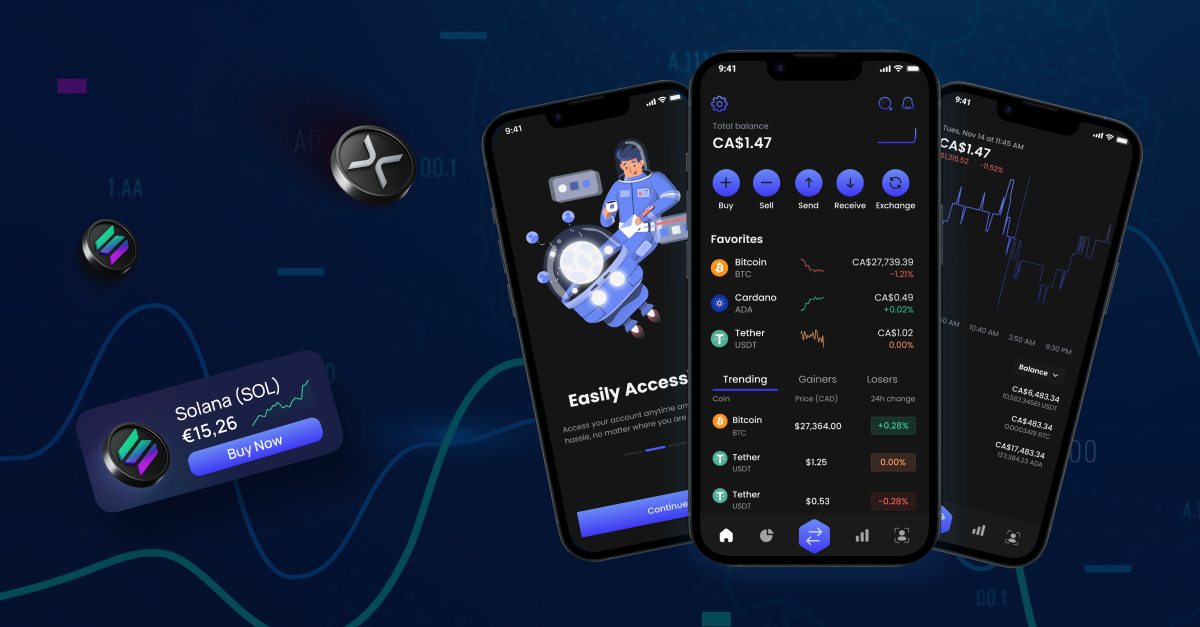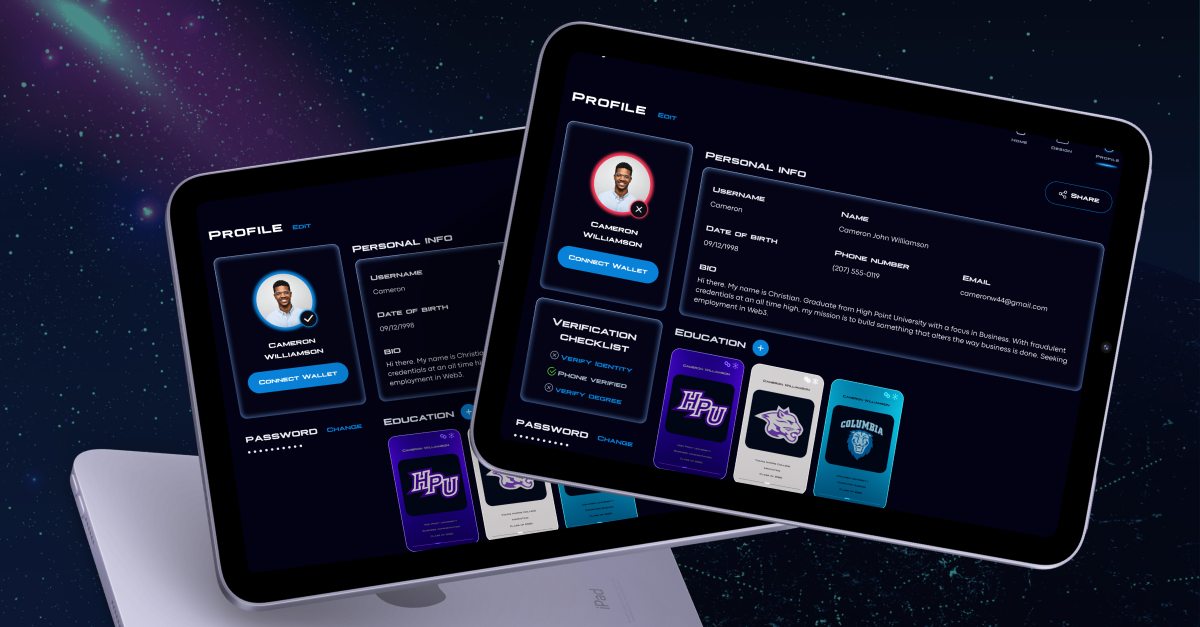Blockchain as a Service (BaaS) is a gateway to leverage blockchain power without managing intricate infrastructure. As we explore BaaS in-depth, we set out to uncover its complex mechanisms, analyze its various applications, and gauge its impact on the future of different industries.
Key Statistics
The blockchain technology market size of the market is $829 million in 2021.
The blockchain as a Service market will grow at a CAGR of 59.3% by 2031.
By 2031, the blockchain market is projected to reach a valuation of $84.6 billion.
What is Blockchain?
Blockchain is a decentralized digital ledger distributed across a network of computers (nodes). The nodes collaborate to validate and record transactions. Multiple copies of the entire blockchain are saved on different nodes throughout the network, ensuring fault tolerance and redundancy.
All operations occurring in the blockchain system are called transactions. When a user creates a digital transaction, signs it with their private key, and broadcasts it to the network, nodes verify the transaction’s authenticity, sender’s funds, and adherence to network rules before achieving consensus on its validity. Valid transactions are subsequently included in blocks.
Each block in the blockchain is encrypted using cryptographic methods, resulting in so-called hashes. Decrypting the hashes is an immensely challenging task. Moreover, since every block contains the hash of the previous one, it is practically impossible to alter the blockchain’s data or structure. It creates one of the primary benefits of blockchain technology – immutability.

Blockchains rely on consensus mechanisms to agree on the state of the ledger. Proof of Work (PoW) is the most well-known consensus mechanism utilized by Bitcoin. In PoW, nodes compete to solve complex mathematical puzzles, with the first node solving the puzzle and obtaining the right to add a new block of transactions to the blockchain.
This process requires substantial computing power and may be resource-intensive. The newly updated blockchain is evenly distributed to all nodes in the network to ensure that each participant possesses the most recent and uniform version of the ledger.
Smart contracts are autonomous, tamper-proof code snippets that operate on a blockchain. They are critical to blockchain ecosystems as they automate and enforce predetermined rules and agreements without relying on intermediaries.
Smart contracts enable direct interaction between the parties, facilitating decentralized transactions prioritizing transparency, security, and immutability. Smart contracts are utilized across various fields. For instance, they facilitate a seamless utilization of blockchain technology in healthcare by automating data collection and entry into an electronic health record (EHR).
What Does Blockchain-as-a-Service (BaaS) Mean?
Blockchain as a Service (BaaS) is a cloud-based service that provides individuals, organizations, and developers convenient access to blockchain technology. It simplifies the process of deploying and managing blockchain infrastructure by offering a streamlined, cloud-hosted solution. For example, a Hyperledger Cello blockchain development tool can create BaaS components.

Users can utilize blockchain technology, including consensus mechanisms, data storage, and smart contracts, without the burden of handling technical aspects, as The BaaS provider manages the infrastructure.
Developers receive a suite of development tools and APIs from BaaS platforms that streamline blockchain app development. These platforms enable users to focus on their app logic rather than the complexities of blockchain development, and scalability is a crucial advantage of BaaS that allows users to adapt resources to changing workloads. The pay-as-you-go BaaS model is cost-effective, as users only pay for the services they use.
Experienced companies that provide blockchain application development services can implement BaaS effectively across supply chain management, finance, healthcare, and identity verification industries. They can ensure regulatory compliance, which is favorable for a Blockchain as a Service (BaaS) market size growing, and technology adoption boosting.
How Does the BaaS Model Work?
The Blockchain-as-a-Service (BaaS) model simplifies blockchain network deployment and management for organizations and developers by providing cloud-based solutions. BaaS operates on cloud computing infrastructure, delivering a pre-configured environment optimized for blockchain operations. Subscribing to BaaS services provides users with features and tools that streamline blockchain development and deployment.

BaaS providers manage the complexities of blockchain infrastructure, such as deploying and maintaining blockchain nodes. These nodes are crucial for validating and storing transactions on the blockchain and are distributed across various data centers to ensure redundancy and resilience. Users are liberated from the technical intricacies of establishing and managing nodes, enabling them to concentrate on creating DApps and smart contracts.
Customization is a fundamental aspect of BaaS that empowers users to customize their blockchain networks according to their needs. Users can choose consensus algorithms, configure permissions models, and define data storage solutions uniquely tailored to their applications. Scalability and performance optimization mechanisms guarantee that blockchain networks adjust to changing workloads and maintain peak performance levels.
Advantages of Using Blockchain-as-a-Service (BaaS)
-
Modern Development
Blockchain as a Service provider commonly uses Containerization and Orchestration to package blockchain nodes and components using Docker. Developers use Containerization to package applications into portable, isolated environments. Orchestration allows automated managing packages in these environments.
Both technologies are commonly used in modern application development. It is crucial in the context of integration of Web3 development solutions that can be easily implemented in BaaS. In addition, Kubernetes is leveraged for efficient management and scaling of these packaged components, enabling the seamless deployment of blockchain networks.
-
All-kind Mechanisms Usage
One of the main benefits of Blockchain as a Service is supporting various options beyond simply Proof of Work (PoW) and Proof of Stake (PoS). These options may involve Delegated Proof of Stake (DPoS), Practical Byzantine Fault Tolerance (PBFT), and others, providing users with the ability to select the consensus model that best matches their application’s needs.
-
Integration and Cross-Chain Compatibility
BaaS solutions offer APIs and connectors for blockchain integration services with external systems, legacy applications, and cross-chain interoperability, allowing for seamless flow of assets and data between networks. This feature is beneficial for applications that require interaction with various blockchain ecosystems and industries, such as supply chain management, where the blockchain must interact with pre-existing software and databases.
-
Permissioning and Identity Management
BaaS platforms provide robust features for permissions and identity management. Users can set detailed access controls to ensure authorized participants can exclusively join the network and perform specified actions, which is particularly crucial in enterprise systems.
-
Improved Scalability and Security
BaaS platforms try to balance the pros and cons of blockchain, and scalability is the most serious disadvantage of the blockchain networks. Load balancing techniques are implemented in BaaS platforms to distribute network traffic across blockchain nodes evenly. Horizontal scalability is achieved by adding or removing nodes as needed, ensuring optimal performance even in high traffic.
BaaS providers implement multi-layered security measures, including encryption, access controls, and Hardware Security Modules (HSMs) to protect cryptographic keys. Regular security audits and pen testing are conducted to identify and address vulnerabilities.
-
Simplified Maintenance and Monitoring
Blockchain as a Service (BaaS) platforms offers users a complete set of tools to monitor network performance, track transaction throughput, and gain valuable insights into smart contract behavior, which can be used for fine-tuning and optimization.
Maintenance and upgrades, such as blockchain software upgrades and security patching, are handled by BaaS providers, reducing the burden of routine network maintenance. Users are typically notified in advance of any planned maintenance to minimize disruptions.
How Does BaaS Help Businesses?
Efficient Strategy
BaaS provides multiple advantages for effective strategy development, including cost savings, faster time to market, and simplified implementation. BaaS enables businesses to reduce upfront capital investment and operational expenses by offering subscription or as-needed payment options.
Moreover, BaaS delivers readily available development tools and infrastructure, accelerating a company’s ability to introduce blockchain-based products and services to the market. It simplifies adopting blockchain technology, making it accessible to inexperienced companies. This lets businesses concentrate on core competencies while BaaS providers tackle technical hurdles.
Establishing Trust
BaaS platforms provide diverse consensus algorithms. Each algorithm has its technical complexities. PoW requires miners to compete in solving intricate mathematical puzzles. In contrast, PoS depends on validators who stake cryptocurrency to confirm transactions.
Immutable records are established using cryptographic hash functions that create unique digital fingerprints for each block. Once a block is added to the chain, modifying any data in a prior block necessitates revising all the following blocks, rendering it computationally impractical.
These mechanisms and cryptographic processes establish trust by attaining consensus on the status of the blockchain without depending on a central authority, thereby elevating the data’s integrity.
Establishing Contracts
Smart contracts are self-executing code pieces stored on the blockchain and are resistant to tampering. They are operated using an Ethereum Virtual Machine (EVM) or a similar execution environment. These contracts execute predefined functions when triggered by transactions, making them trustworthy and deterministic.
BaaS platforms support the development of customized smart contracts using programming languages such as Solidity or Vyper. These contracts can utilize sophisticated logic, cryptographic functions, and multi-signature mandates to enforce precise business regulations and stipulations.
Transfer of Value
BaaS platforms usually support cryptocurrencies, each with a unique protocol and underlying technology. For instance, Bitcoin uses a UTXO model, while Ethereum uses an account-based model. Integrating these cryptocurrencies into applications requires expertise in their APIs and protocols.
Tokenization involves generating digital representations (tokens) of real-world assets on the blockchain. To effectively create, transfer, and manage tokens, it is essential to have a thorough understanding of token standards such as ERC-20 or ERC-721, as well as the corresponding smart contract code that governs these processes.
Smart Contracts
Smart contracts are compiled into bytecode and executed on blockchain nodes. Once deployed, the contract’s bytecode is immutable, meaning it can’t be changed. This ensures that the contract’s functionality stays consistent throughout its lifecycle.
Smart contracts are executed on numerous nodes in a decentralized network, boosting trust by eliminating any possibility of a single point of failure or manipulation. Finally, execution results are verified via consensus among nodes.
Audit Capabilities
BaaS providers offer comprehensive audit trail capabilities by recording all blockchain interactions in a structured format. Detailed logs and event records allow for analyzing transaction history to track the sequence of actions, which ultimately helps in forensic analysis, regulatory compliance, and internal audits.
Blockchain’s transparency stems from its public ledger, where all transactions are visible. This feature empowers users to examine transaction details, including sender, receiver, amount, and timestamp, further enhancing transparency.
Use Cases of Blockchain-as-a-Service
-
1.Supply Chain Management
BaaS can establish transparent and traceable supply chain networks. Stakeholders can record and verify product origin, shipment, and delivery in real-time. This is especially useful in verifying product authenticity in the food, pharmaceuticals, and luxury goods industries.
-
2.Financial Services
BaaS can be utilized in fintech app development services as a secure and efficient platform for cross-border payments, remittances, and trade finance. It can also facilitate creation and handling digital assets, such as cryptocurrencies and tokenized securities.
-
3.Healthcare
BaaS can improve healthcare data management, ensuring the safety and compatibility of electronic health records (EHRs). Patients can regulate their data, allowing healthcare providers access when necessary while preserving privacy and security.
-
4.Real Estate
BaaS platforms facilitate tokenizing tangible assets, such as real estate properties. This represents property ownership via blockchain tokens. These tokens are simple to transfer, divide, and trade, thus broadening the accessibility of real estate investments to a wider investor base.
-
5.Voting Systems
BaaS can also create secure and transparent electronic voting systems that use blockchain to ensure the integrity of votes and provide a verifiable audit trail, which reduces the risk of election fraud.
-
6.Smart Contracts
BaaS facilitates creating and implementing smart contracts that automate diverse business processes. Examples of application cases encompass processing insurance claims, reaching automated supply chain agreements, and building decentralized applications (DApps).
-
7.Intellectual Property Rights
BaaS can also be leveraged to timestamp and archive intellectual property (IP) entitlements such as patents, copyrights, and trademarks. This ensures irrefutable proof of ownership, safeguarding creators’ IP.
-
8.Gaming and Entertainment
BaaS enables in-game asset ownership, allowing players to own and trade virtual assets truly. Additionally, it facilitates the creation of decentralized content platforms and digital rights management that can be extremely helpful in NFT development.
Conclusion
Blockchain-as-a-Service (BaaS) is a game-changing technological breakthrough that empowers businesses in diverse industries to leverage blockchain capabilities without the burden of managing underlying infrastructure complexities. The platform delivers secure, transparent, and efficient solutions that enhance trust, streamline operations, reduce expenses, and promote innovation.

FAQs
-
What are the three advantages of using blockchain technology?
Immutability: Once data is recorded on the blockchain, it cannot be altered or deleted. This increases trust in the data and prevents fraud or unauthorized changes. It is precious in applications where data integrity is critical, such as supply chain management, voting systems, and financial transactions.
Transparency: In blockchain, each transaction is recorded in a public ledger that all network participants can view. This transparency allows every party involved to verify and validate transactions independently. The technology is immensely valuable for supply chain management, finance, and voting systems, where access to transaction history and data integrity remains essential.
Decentralization: The decentralized nature of blockchain networks distributes data across multiple nodes, making it highly immune to single points of failure and cyberattacks. All network participants have a copy of the entire blockchain, ensuring redundancy and robustness. This decentralization also minimizes the necessity of intermediaries, lowering the risk of data breaches and reducing costs associated with trust-based systems.
-
What is one of the reasons to consider implementing a blockchain solution?
One reason to consider implementing a blockchain solution is to bolster security and ensure data integrity. Blockchain technology’s decentralized and cryptographic nature furnishes a resilient security layer that renders it highly impervious to unauthorized access, tampering, and fraud. By using blockchain, organizations can guarantee the immutability and transparency of their data, which is crucial in applications where data integrity and trust are vital, like healthcare records and financial transactions.
-
What is Blockchain as a Service (Baas)?
Blockchain as a Service (BaaS) is a cloud-based service that grants businesses and developers access to blockchain infrastructure and technology without the hassle of creating and administering their blockchain networks. BaaS enables users to deploy, operate, and expand blockchain applications and smart contracts without additional burden.







